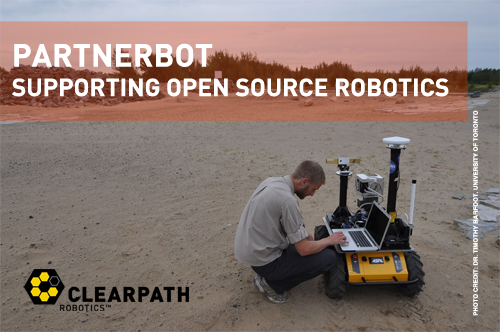
Today we released an update to ROS Fuerte. This included updates to 67 stacks throughout the rosdistro. This includes several stacks which have upgraded to add support for Fuerte including:

Today we released an update to ROS Fuerte. This included updates to 67 stacks throughout the rosdistro. This includes several stacks which have upgraded to add support for Fuerte including:
From Luis Roalter on ros-users
Hi all,
We are happy to announce our current status on enabling IPv6 on ROS Nodes. It is still beta and in progress as part of a Diploma Thesis in our research group.
For questions please use ros-network@lists.vmi.ei.tum.de to directly contact us; or just use this mailing list.
See also http://ros.org/wiki/ros_comm6
=-=-=-=-=-=-=-=-=-=-=-=-=-=-=-=-=-=-=-=-=-=-=-=-=-=-=-=-=-=-=-=-=-=-=-=-
With ros_comm6 we are introducing an IPv6 enabled variant of the ros_comm stack.
It features an IPv6 enabled master as well as IPv6 enabled client libraries for C++ and Python. The roswtf utility has also been modified to support IPv6.
You can find the code for the stack at:
https://svn.vmi.ei.tum.de/vmi-ros-pkg/trunk/ros_comm6/
The IPv6 features of the stack are enabled by setting the environment variable ROS_IPv6 to 'on'. The master then starts to listen on IPv4 and IPv6 addresses and nodes try to connect using IPv6. Nodes using IPv4 will still be able to connect to servers and publishers using IPv6.
IPv6 capable subscribers are currently not able to connect to publishers using IPv4, but is on our TODO list. (Trying to connect to all available addresses, until a successful connection can be made)
To use the stack a few steps have to be performed (it is assumed that you build ROS from source):
1) Replace your 'ros_comm/' directory in 'ros-underlay/' with the 'ros_comm6/' directory from the repository.
2) Remove your ROS installation from '/opt/ros/fuerte'. The reason for this is that the includes from the original ros_comm stack confuse the build system. 3) Build and install ROS again. 4) Check '/etc/hosts'. Make sure that 'localhost' and your hostname also point to '::1'. 5) Add 'export ROS_IPv6=on' to your .bashrc or other startup scripts.
The code is currently tested using Linux. Your millage on Windows or other Unix distributions might vary. This especially affects the dual stack behavior. (The IPV6_V6ONLY socket option is currently not modified)
We have tested the stack in a small test environment at our lab. Yet most of the code is probably untested, as it handles a lot of corner cases and configuration parameters. If you run into any problems using the stack please contact us or send us a patch.
From David Lu on ros-users
Hey all,
Inspired by ROSCon this year, I realized that there was quite a bit of code that our lab has developed that we had yet to push to our public repository. For links to each of the packages, check out our repository's wiki page here: http://ros.org/wiki/wu-ros-pkg
Note that new stable WashU stacks are being released on a branch of our Google Code repo http://code.google.com/p/wu-robotics/source/browse/#svn%2Fbranches%2Fstable . If you are still referencing the Sourceforge repo, that will remain up, but not updated.
A quick overview:
We have a number of simple PR2-based demos that we developed since getting our PR2 last summer. These are mainly used for showing off the robot to the general public. They include demos where the robot mimics human motions (pr2_kinect_teleop), has simple conversations (pr2_chat), looks at recognized faces (face_follower, formerly known as pr2_creeper) and swings a plastic lightsaber (pr2_sith).
There's also a tool for doing some basic tasks, i.e. controlling the projector and spine, from the command line (pr2_commandline)
We had previously released a driver/node for the B21r. Thanks to Thibault Kruse, Christina Lichtenthaeler and Mikhail Medvedev, we have not only improved this stack, but also added initial support for the atrv-jr. I have also added in a few improvements to the B21r node based on Chad Rockey's ROSCon talk on Hardware Drivers, upgrading the node to use dynamic_reconfigure and diagnostics. I've also added a teleop program we use, as well as a new dashboard. (See next section)
There are a number of general ROS tools that we've developed here that others may also find useful.
First, a package for making dashboards like the PR2 and turtlebot have (generic_dashboard). It's not complete yet, but there's enough capability that I was able to make the B21r dashboard.
Second, there's a forked version of rxgraph (rxgraphplus) which allows for hierarchical organization.
We also have tools for * generating visualization markers quickly (easy_markers) * playing a bag as though it is happening now (rosbaglive) * checking how complete your manifest.xml and stack.xml files are (manifest_cleaner)
Since joint_state_publisher and simmechanics_to_urdf have been absorbed into the core ROS stacks, the versions in our repo have changed their names to *_experimental. You can also find the URDF from my ROScon talk in this stack (roscon_urdf).
Some tools for reading in MIDI files and sending around musical information can be found in the music stack. We also have a demo from one of our rotation students that implements differential dynamic programming in ROS (color_DDP).
Besides the work that makes up our actual research, here's a few things we hope to get out in the next months. * Merging urdf_python into the urdf_parser package * Further motion_capture analysis tools * New people recognition tools
Cheers, David V. Lu!!
From Armin Hornung on ros-users
Dear ros-users,
I'm happy to announce the release of the humanoid_navigation stack version 0.3.1. Mostly due to the work of Johannes Garimort, this release contains many improvements under the hood (new & simpler footstep parameterization, better replanning capabilities, ...). This version also marks the first "proper" release as binary package for ROS electric. DEBs are already built in the shadow repository and will become public once a new iteration of electric packages is rolled out. Until then, you can get the newest version from source (SVN checkout from trunk or [1]).
The sources also build under ROS Fuerte and binary packages are in preparation.
As always, feedback and patches are welcome!
For details and documentation, see http://www.ros.org/wiki/humanoid_navigation and http://www.ros.org/wiki/footstep_planner
Best regards, Armin
[1] http://alufr-ros-pkg.googlecode.com/svn/tags/stacks/humanoid_navigation/humanoid_navigation-0.3.1/
From Dmitry Berenson
Hi everyone,
We're happy to announce a new package that uses a robot's previous experience to plan paths faster than planning-from-scratch alone.
The package is called LightningROS, and it is an implementation of the Lightning Path Planning Framework described in this paper:
A Robot Path Planning Framework that Learns from Experience Dmitry Berenson, Pieter Abbeel, and Ken Goldberg IEEE International Conference on Robotics and Automation (ICRA), May, 2012. http://automation.berkeley.edu/~berenson/lightning.pdf
This package uses OMPL planners to implement each component in lightning and can be called the same way as any other OMPL planner.
The package website is here: http://sourceforge.net/projects/lightningros/ .
The wiki describing installation, examples, etc. is here: https://sourceforge.net/p/lightningros/wiki/Home/
Please join our users list (click the Mailing Lists tab on the http://sourceforge.net/projects/lightningros/ page) to post questions/comments, we'd love to hear your feedback!
The code was developed at UC Berkeley by Cameron Lee and Dmitry Berenson under the supervision of Prof. Pieter Abbeel and Prof. Ken Goldberg.
Clearpath Robotics is offering a grant to academic researchers who use ROS. Equipment grants for robotics research are often hard to come by. To remedy this, Clearpath Robotics started the PartnerBot Grant Program in the hopes of putting robots into the hands of deserving researchers.

The purpose of this grant is to facilitate research and increase the speed of robotics development by encouraging publishing results and adding to open source initiatives. One of the prerequisites of the PartnerBot Grant requires the research team to use ROS and publish their findings, this includes posting any code they write to the ROS wiki and giving back to the community.
The PartnerBot Grant Program provides funding for one Clearpath Robotics Husky A200 and associated customization services, worth a total of $25,000. The Husky A200 is a rugged unmanned research platform that is perfectly suited for all-terrain outdoor purposes. ROS is fully integrated and it is completely customizable to suit your individual unmanned vehicle needs.
Don't miss your chance to fund your research! Visit www.clearpathrobotics.com/partnerbot for more information.
Dear ROS'er,
With this email I want to announce the "geometric-relations-semantics" software (http://www.orocos.org/wiki/geometric-relations-semantics-wiki and http://www.ros.org/wiki/geometric_relations_semantics ).
The geometric relations semantics software (C++) implements the geometric relation semantics theory, hereby offering support for semantic checks for your rigid body relations calculations. This will avoid commonly made errors, and hence reduce application and, especially, system integration development time considerably. The proposed software is to our knowledge the first to offer a semantic interface for geometric operation software libraries.
The goal of the software is to provide semantic checking for calculations with geometric relations between rigid bodies on top of existing geometric libraries, which are only working on specific coordinate representations. Since there are already a lot of libraries with good support for geometric calculations on specific coordinate representations (The Orocos Kinematics and Dynamics library, the ROS geometry library, boost, ...) we do not want to design yet another library but rather will extend these existing geometric libraries with semantic support. The effort to extend an existing geometric library with semantic support is very limited: it boils down to the implementation of about six function template specializations.
The software already includes orocos typekits and already supports the KDL geometry types and ROS geometry types. Furthermore, it is fully Orocos and ROS compatible.
The wiki page (http://www.orocos.org/wiki/geometric-relations-semantics-wiki) contains background information, software design discussion, API, Quick start, User guide, tutorials, FAQs, and use cases.
We will be happy to receive any kind of feedback!
Kind regards,
Tinne De Laet
PS: The software is based on the paper "Geometric Relations between Rigid Bodies: Semantics for Standardization" (available at http://people.mech.kuleuven.be/~tdelaet/geometric_relations_semantics/geometric_relations_semantics_theory.pdf ), which is accepted for publication as a tutorial in IEEE Robotics and Automation Magazine.
From Pablo Ramirez at UT Dallas
Hello,
I'm a student at UT Dallas, and we have a ROS driver for the AR.Drone. It is an early version, and it has almost the same functionality as the ardrone_brown package. The main difference and advantage is that it is written using rosjava and javadrone.
This means that no matter how broken the official SDK is on current or future versions of Linux, we could always have a ROS driver as long as a Java Virtual Machine is present. Moreover, if somebody has the skills this could be ported to Windows or Android, since it does not use native code at all.
You can find this package at https://github.com/jpiramirez/ardrone_utd
There are a couple of Wiki entries explaining how to install and use it.
Suggestions and bug fixes are very welcome!
Find this blog and more at planet.ros.org.